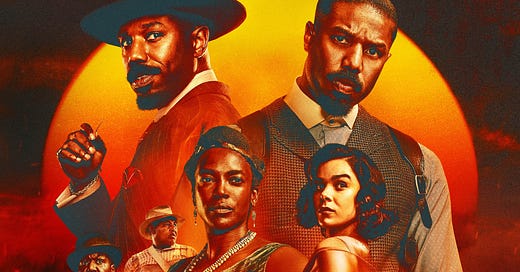After watching the haunting, genre-bending film Sinners, I sat with the weight of what it means to be inherited by grief, haunted by memory, and asked to survive a world that feeds on your song.
This film made me think about how much we carry —
and how often what we carry was never ours to begin with.
Trauma passed down like a hand-me-down guitar.
Grief inherited like land that never grew anything but pain.
The real story isn’t the monsters.
It’s the legacy.
I watched Sinners, and it was more than a film —
it was a mirror, a ritual, a reckoning.
It reminded me that in this world, evil rarely shows up with horns and fire.
More often, it wears a smile.
It offers a drink.
It sings your grandmother’s song.
Evil doesn’t break in.
It waits to be welcomed.
Because invitation is the most dangerous ritual we perform.
Sometimes we open the door out of hospitality.
Sometimes out of hunger.
Sometimes out of a need to feel anything at all.
But in Sinners, the most dangerous thing you can do is say yes.
Yes to comfort.
Yes to false family.
Yes to the lie that safety comes without discernment.
Because the devil’s greatest trick isn’t seduction —
it’s familiarity.
“Can’t we, just for one night, be family?”
That’s the question that haunts this film.
Because by the time you realize the family ain’t yours,
the feast has already begun — and you’re on the menu.
And still, Sinners is not a story about deception.
It’s a story about how tired people are.
How even the most fortified among us can be worn down
by time, temptation, and tradition.
How memory and magic can be confused for safety —
and how even sacred things can be used to summon death.
The blues in Sinners isn’t just music — it’s memory.
It’s a practice.
A power that pierces the veil between worlds.
Music here is more than rhythm.
It’s a reckoning.
And the horror is that the thing Black folks created to survive
becomes the very thing that draws death to the door.
What do you do when your gift is the very thing that gets you hunted?
This film doesn’t offer a neat answer.
Because survival isn’t neat.
In this world, survival is calculated.
It’s code-switching and hood justice.
It’s doing what needs to be done, even if it breaks your heart.
It’s teaching someone how to negotiate before they know how to pray.
It’s knowing how to make a deal with the devil.
It’s knowing that rituals alone won’t save you —
not when the sun is going down and the wrong thing’s already inside.
And still — grief is the undercurrent.
A grief so dense it becomes ancestral.
Not just personal loss,
but the spiritual exhaustion of always having to outlive your pain.
Of seeing love bent by history — weaponized,
complicated, strategic, seductive.
Of knowing that Black grief doesn’t always get ritual.
That some of us die soft. But many of us don’t.
And some of us don’t even get to die at all —
we just keep walking, hollowed.
There’s a line Annie says — something I haven’t been able to stop thinking about:
When you’re turned, your soul is trapped.
You can’t go home.
You’re cursed to stay in a world that keeps playing your music but erases your name.
You’re made to walk in a body filled with hate,
even if you used to be love.
Which means the greatest horror isn’t death —
it’s disconnection.
It’s being denied your return.
It’s being frozen in the very hate that tried to consume you.
And isn’t that what so many of us are fighting against?
This film reminded me:
Evil isn’t always loud.
Sometimes it’s a lullaby.
Sometimes it’s an old friend.
Sometimes it’s the feeling of being seen — right before you get swallowed.
And yet… Sinners isn’t hopeless.
It’s soaked in blood and fire,
but it’s also steeped in resistance.
In discernment.
In memory.
It shows us the cost of freedom.
And it also shows us what it looks like —
if only for a moment.
“For a few hours, we was free.”
That line is more than a reflection.
It’s a eulogy.
A love letter.
A battle cry.
Because maybe the goal isn’t to be untouched.
Maybe it’s to be free long enough to remember who we are.
To close the door in time.
To name the thing for what it is.
To tell the story so someone else doesn’t have to bleed for the same lesson.
I don’t think Sinners is about defeating evil.
I think it’s about recognizing when it enters wearing a familiar face —
and choosing to fight for your soul anyway.
It’s about legacy.
And lineage.
And leaving something more behind than scars.
It’s about what it means to burn something down —
not in rage, but in release.
To say: this will not live in me anymore.
To say: I choose the ancestors. I choose the light.
And if all we get is a few hours of freedom —
then let them be sacred.
Let them be loud.
Let them be soft.
Let them be ours.
About the Author
Sonia Issa is a writer, public speaker, and cultural thinker whose work explores survival, softness, and spiritual legacy. She believes in making space for joy without performance and grief without punishment. Her writing lives at the crossroads of resistance and restoration.





